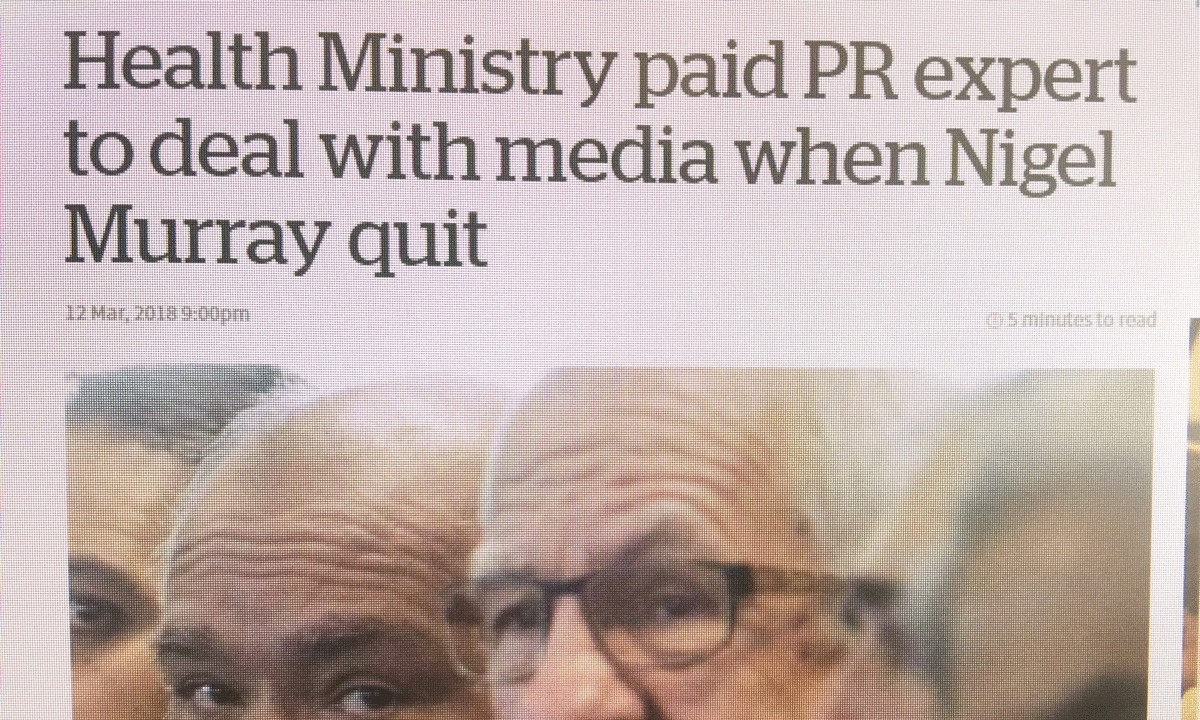
PR agency dragged into DHB debacle
You probably saw the Herald article throwing up its hands in horror at the idea of the Health Ministry actually paying a PR expert to deal with media when DHB chief exec Nigel Murray left under a cloud. The implication of course, dear reader, is that the DHB should have battled through with its own PR and communications staff.
The article is mostly about the DHB crisis, and who paid the invoice. But it does give a breathless account of how Julian Leys from Senate SHJ sought to “reset the media narrative”, “cost taxpayers $20,000”, “stay in control of the facts and keep it simple”, “advised Simcock on issues directly affecting his reputation” and the detailed work involved: formulating a timeline, writing the Chairman’s resignation letter and (gasp) writing Q&As and a media release.
This is bread and butter to us: none of it is amoral, unexpected, or even faintly scandalous. Though I don’t know the detail, $20k doesn’t seem unreasonable for that high level of advice, and likely urgency – and the Ministry look like they agree. I’m pretty sure the lawyers and HR people involved charged similarly.
And (more breathlessness), all this “despite the DHB having its own in-house communications department and executive director of public and organisational affairs”. Anyone who’s been in that situation knows it’s usually better to have the PR bat wielded by an external, if it involves your own boss and chairman resigning. Emotions and powerplays are running high.
I do note that the article did not include the term ‘spin doctor’, and I would like to thank the NZ Herald’s Hamilton-based reporter Natalie Akoorie for that.
What’s a bit sad is that all the sensible-sounding explanations are there, but they are right at the bottom where most people won’t read to: why the Ministry didn’t want invoices going to the DHB (because it would have alerted the CE which could have compromised the investigation), that the Ministry does support private PR advice (as if we ever wondered), and why they brought in outside PR help (it wasn’t appropriate to involve staff who ultimately reported to the CE).
PRINZ continually works to present our profession as hard-working, worthwhile, and ethical. There will always be articles like this, and it’s not particularly fair that there aren’t as many articles about HR advisers or lawyers.
The more our PRINZ members get out there with blogs, stories, and media comment about what we do, the less cause the media will have to get breathy about it: we can all help.
Communications Professional
6yOne of the interesting aspects of this to me is the application of the OIA for those of us who sometimes provide counsel to government organisations. Personally, I regard any advice I give as commercial information and will mark all correspondence accordingly. Clearly, we put a value on our advice and to then see it published freely in the media is damaging commercially - well, I'm at least prepared to discuss that rationale with the Ombudsman. I'd recommend anyone providing advice commercially to "OIAable" agencies mark correspondence and advice accordingly - and include some obligations around the protection of that advice in your contracts.
Head of External Relations and Stakeholder Engagement at Fortysouth
6yThe problem is perception and PR to most people means spin - rightly or wrongly its a reality. I personally don’t use PR as a descriptor for what I do, not because of the connotation but because I believe our role and the value we bring to our organisations as a crucial supporting function far exceeds PR. We also have no qualms about hiring external expertise during a crisis. They are a critical support function to help us sense check, bounce ideas and most importantly bring some fresh thinking to the table.
Director at Southern PR Ltd
6yWell said Katie - couldn’t agree more. PR specialists in crisis and reputation management often find that many businesses simply don’t realize the value an external practitioner brings to their situation until it happens to them.
Associate Professor, School of Management and Marketing, the University of Waikato, NZ
6yWell written response Kathie. It is frustrating to see that journalists still can't acknowledge the legitimacy of PR services and don't understand the inevitable need to employ PR experts during crisis. The in-house communicators are responsible for the ongoing communication on behalf of the organisation and usually don't have the time and expertise to deal with an overwhelming crisis.
Founder, Man on Fire | Strategy, Narrative, Leadership, Delivery | Currently on contract - available June 2024
6yI’ve always found it sad that PR & comms in general gets some of the most wilfully misdirected coverage. There are sometimes very interesting stories to be told, that would give real insight into the workings of power: but as you say, far easier to reach for the same old handful of candy.